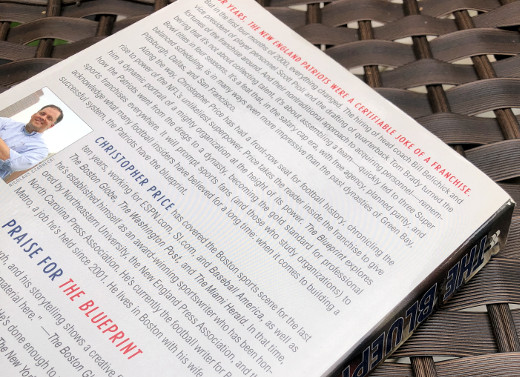My Takeaways From The Blueprint
The success the New England Patriots has had over just under the last 2 decades is rare in modern sports. Not only 6 Super Bowls, but 9 overall appearances in the big game and being a perennial contender in an age of free agency with only a few variables common. It is an accomplishment that has won them both praise and scorn, with both sometimes coming from the same people.
So how did it happen? If you have been a reader here at The Hot Iron for a while, you will know I am a Patriots fan, going back decades, and once co-owned one of the Patriots’ first fan Web sites. It wasn’t always sunshine and rainbows for this football franchise. The fact that Monday Night Football wouldn’t hold games at their former stadium for years because of gunfire in the parking lot is one glaring example. But things changed – namely a new owner, coach and quarterback – and there’s the success we have today.
It didn’t happen overnight, and with the new owner it all didn’t fall into place right away either. This is the topic of The Blueprint: How the New England Patriots Beat the System to Create the Last Great NFL Superpower by Christopher Price. It gives a surprisingly detailed account of what led to their first Super Bowl and the next several seasons which followed it. Even for a true blue (and silver) fan as myself, I had some takeaways from this book.
I forgot a lot of details – Price goes into great detail in this book, and there were many facts and events that even I, someone who lived in the Boston area at the time of their first Super Bowl, didn’t remember. One glaring example was that at the end of the 2000 season, the season before their first Super Bowl win, they cut both Bruce Armstrong and Troy Brown. This was part of Bill Belichick’s “blueprint” for not paying players too much. Both were eventually resigned, albeit for lower salaries, and earned rings the following season.
Keep moving forward – If you don’t succeed, try, try again. This cliché phrase is really the mantra of the team. When new owner Bob Kraft hired Bill Parcells he had player personnel managed by someone else, Bobby Grier, which led to Parcells leaving after losing in Super Bowl XXXI. Kraft learned from this when he hired Belichick as coach, and Grier was fired. Belichick is famous for saying “On to (insert next opponent here)” meaning the last game is in the past, and they have to focus on winning the next one.
More than just a blueprint – If the success of the Patriots could truly be in blueprint form, then why haven’t other teams followed it? In order to execute on the blueprint, a team has to have the mindset and people to follow it. This is in itself a challenge, as it goes against how most teams in the league are managed. For example, having a head coach with full authority is not common, as most teams have a general manager or other role that is the true leader of what happens on the field. Many teams – and their owner’s egos – would have a hard time with this, no matter the sport.
Early on I mentioned The Blueprint only covered a few seasons after the Patriots’ first championship, and that’s because it came out in 2007, and now 12 years later I am reading and writing about it. Where I don’t exactly recall where I got it, I imagine it was sent to me by a publisher back in the day when I used to read more and write about those books more. Despite the dozen years that have passed since its words first hit paper, Price’s book is still a great read, especially for those who love deep details on sports. This book is now in the hands of a friend who sat next to me at many Patriots games.
This is from The Hot Iron, a journal on business and technology by Mike Maddaloni.
Did you enjoy this? Subscribe to The Hot Iron by RSS/XML feed or Read by Email.
Book Take-Aways • (0) Comments • Permalink
Comments
Post a Comment
Note: Comment moderation is active, and your comment will be viewable once it is reviewed.




